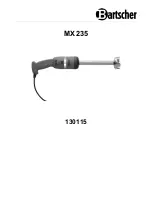
18
ProFX8 and ProFX12
Pr
oFX8 and Pr
oFX12
For hybrid channels (mic input and
stereo line input), the gain control just
affects the microphone input.
For stereo channels (no mic input) the
gain control just affects the line-level
inputs, with 20 dB of gain, and 20 dB of
attenuation. There is no level set LED.
21. LEVEL SET LED
These LEDs are used with the gain control [20] to set
the channel preamplifi er gain just right for each source.
If you hear distortion on one or more of your channels,
check the level set LEDs are not on continuously, and
turn down the gain if they are.
22. LOW CUT
Each channel with a mic input has a low cut switch
that cuts the bass frequencies below 100 Hz, at a rate
of 18 dB per octave. All mic inputs are affected, and the
line inputs of the mono channels.
We recommend that you use low cut on every micro-
phone application except kick drum, bass guitar, and
bassy synth patches. These aside, there isn’t much down
there that you want to hear, and fi ltering it out makes
the low stuff you do want much more crisp and tasty.
Not only that, low cut can help reduce the possibility
of feedback in live situations and help to conserve the
amplifi er power.
20. GAIN
If you haven’t already, please read the gain-setting
procedure on page 3. The gain adjustment allows all
your various source signals from the outside world to be
adjusted to the same optimal internal operating levels.
Setting the gain correctly will ensure that the pre-
amplifi er’s gain is not too high, where distortion could
occur, and not too low, where your quieter, exquisitely-
delicate passages might be lost in background noise.
For mono channels (mic input with a
mono line input), the gain knob adjusts
the input sensitivity of the mic and line
inputs.
Adjust the gain control so the level set LEDs [21]
come on occasionally during the louder moments of your
playing or singing, and go off when you stop.
If the signal comes through the mic XLR jack, there
will be 0 dB of gain (U for unity) with the knob fully
down, ramping to 50 dB of gain fully up.
Through the 1⁄4" mono input, there is 20 dB of
attenuation fully down and 30 dB of gain fully up,
with a “U” (unity gain) mark at 12:00. This 20 dB of
attenuation can be very handy when you are inserting
a very hot signal, need to add a lot of EQ boost, or both.
Without this “virtual pad,” this scenario might lead to
channel clipping.
MID
2.5kHz
MID
2.5kHz
MID
2.5kHz
MID
2.5kHz
MID
2.5kHz
80Hz
LOW
U
+15
-15
U
+15
-15
U
+15
-15
R
L
LOW CUT
100 Hz
U
GAIN
MI
C GAIN
U
+50
-20dB
+30dB
4
12kHz
HI
MID
2.5kHz
80Hz
LOW
U
+15
-15
U
+15
-15
U
+15
-15
12kHz
HI
MID
2.5kHz
80Hz
LOW
U
+15
-15
U
+15
-15
U
+15
-15
12kHz
HI
MID
2.5kHz
80Hz
LOW
U
+15
-15
U
+15
-15
U
+15
-15
12kHz
HI
PAN
AUX
U
+15
O
O
MON
FX
U
+15
O
O
R
L
PAN
AUX
U
+15
O
O
MON
FX
U
+15
O
O
R
L
PAN
AUX
U
+15
O
O
MON
FX
U
+15
O
O
R
L
PAN
AUX
U
+15
O
O
MON
FX
U
+15
O
O
80Hz
LOW
U
+15
-15
U
+15
-15
U
+15
-15
R
L
LOW CUT
100 Hz
12kHz
HI
PAN
AUX
U
+15
O
O
MON
FX
U
+15
O
O
80Hz
LOW
U
+15
-15
U
+15
-15
U
+15
-15
R
L
LOW CUT
100 Hz
GAIN
7/8
5/6
12kHz
HI
PAN
AUX
U
+15
O
O
MON
FX
U
+15
O
O
80Hz
LOW
U
+15
-15
U
+15
-15
U
+15
-15
R
L
MI
C GAIN
U
+50
GAIN
MI
C GAIN
U
+50
9/10
12kHz
HI
LEVEL
SET
LEVEL
SET
LEVEL
SET
LOW CUT
100 Hz
U
GAIN
MI
C GAIN
U
+50
-20dB
+30dB
LEVEL
SET
LEVEL
SET
LEVEL
SET
LOW CUT
100 Hz
U
GAIN
MI
C GAIN
U
+50
-20dB
+30dB
LOW CUT
100 Hz
U
GAIN
MI
C GAIN
U
+50
-20dB
+30dB
PAN
AUX
U
+15
O
O
MON
FX
U
+15
O
O
GAIN
80Hz
LOW
U
+15
-15
U
+15
-15
U
+15
-15
U
+20
-20
GAIN
U
+20
-20
R
L
11/12
EQ
EQ
EQ
EQ
EQ
EQ
EQ
EQ
12kHz
HI
PAN
AUX
U
+15
O
O
MON
FX
U
+15
O
O
dB
30
20
10
10
O
O
40
50
5
5
U
60
dB
30
20
10
10
O
O
40
50
5
5
U
60
dB
30
20
10
10
O
O
40
50
5
5
U
60
dB
30
20
10
10
O
O
40
50
5
5
U
60
dB
30
20
10
10
O
O
40
50
5
5
U
60
dB
30
20
10
10
O
O
40
50
5
5
U
60
dB
30
20
10
10
O
O
40
50
5
5
U
60
dB
30
20
10
10
O
O
40
50
5
5
U
60
3
2
1
OL
OL
OL
OL
OL
OL
OL
OL
MUTE
MUTE
MUTE
MUTE
MUTE
MUTE
MUTE
MUTE
20
21
22
23
24
25
26
27
28
29
30
31
GAIN
U
+20
-20
GAIN
MI
C GAIN
U
+50
LEVEL
SET
LEVEL
SET
U
GAIN
MI
C GAIN
U
+50
-20dB
+30dB
















































